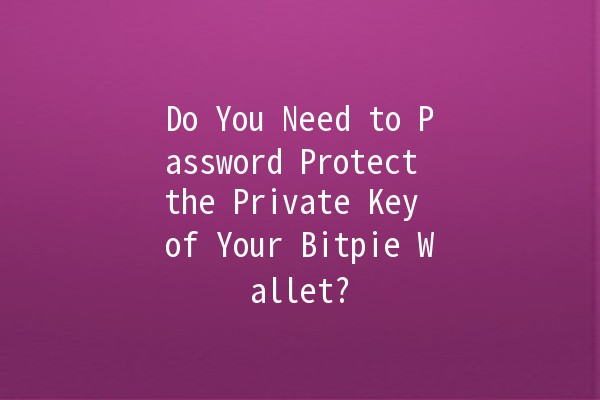
In the world of cryptocurrency, managing your digital assets securely is paramount. One of the key components of ensuring your cryptocurrencies are safe is your wallet's private key. When it comes to Bitpie, a popular cryptocurrency wallet, many users often wonder: should I password protect my private key? In this article, we'll explore the importance of private key protection, best practices, and actionable tips to enhance your wallet's security.
Understanding the Importance of Private Keys
A private key is a string of data that acts as a password allowing you to access and manage your cryptocurrency assets. Anyone with access to your private key can control your digital currencies, making it crucial to keep it secure. A compromised private key can lead to loss of funds, making understanding its importance the first step in securing your wallet.
Why Password Protection Matters

Best Practices for Password Protecting Your Private Key
A strong password is your first line of defense. It should be a combination of letters, numbers, and special characters. Here’s an example of a strong password: `G7#h8K!p2j$R3`. Avoid common words and phrases, and ensure it’s unique to your wallet.
Application Example:
When establishing your Bitpie account, input a password that meets the strong criteria above. Make use of a password manager if necessary, to keep track of your passwords.
Twofactor authentication adds another layer of security, requiring a second verification step in addition to your password. This could be a text message code or an authentication app code when logging in.
Application Example:
Enable 2FA in your Bitpie account settings. Whenever you log in, you will need to enter the additional code sent to your mobile, which drastically decreases the chance of unauthorized access.
Backing up your wallet ensures that you can recover your private key in case of loss or theft. Use a secure method to store your backup, such as an encrypted USB drive or a secure cloud storage option.
Application Example:
Periodically back up your Bitpie wallet. If you ever need to restore it, having this backup will allow you to regain access without needing to remember your private key.
Ensuring your wallet software is up to date can protect you from known vulnerabilities. Developers often release updates that fix security issues. Ignoring updates could leave you exposed.
Application Example:
Regularly check for updates in your Bitpie app. Set it to automatically update to ensure you always have the latest version, minimizing your risk of security threats.
Using public WiFi can expose your wallet to potential hacking attempts. If you must access your wallet over a public network, use a Virtual Private Network (VPN) to encrypt your connection.
Application Example:
When accessing your Bitpie wallet in a café, connect through a reputable VPN service. This encrypts your data transmission, reducing the risk of interception by malicious actors.
Other Security Measures to Consider
Hardware Wallets
For those with significant cryptocurrency investments, consider using a hardware wallet alongside your Bitpie wallet. These devices store your private keys offline, providing enhanced security against online threats.
Cold Storage
For longterm holding of assets, you might consider cold storage solutions. This method involves securing your assets offline, making it extremely difficult for hackers to gain access.
Educate Yourself
Stay informed about the latest cybersecurity threats and wallet security practices. The landscape is continually evolving, and being knowledgeable can help you stay one step ahead.
Frequently Asked Questions
If someone gains access to your private key and you haven't password protected it, they can freely access and transfer your cryptocurrencies, leading to possible total loss of your funds.
Unfortunately, if your private key is compromised, it effectively gives control over your assets to another party. Cryptocurrency transactions are irreversible, and there is no way to recover lost funds.
Storing your private key on your phone can be risky, especially if the device is not secure. If you do choose to store it digitally, ensure it is encrypted and backed up securely.
It is recommended to change your passwords regularly, such as every six months, or immediately if you suspect any breach or unauthorized access to your wallet.
Signs of a compromise can include unauthorized transactions, sudden access lockouts, or alerts from your wallet provider about security risks. If you notice anything unusual, immediately take action to secure your wallet.
Yes, you can use Bitpie in conjunction with other wallets. Many cryptocurrency users employ multiple wallets for different purposes, such as daily transactions versus longterm storage.
Safeguarding your cryptocurrency investments starts with understanding the importance of your private key and password protecting it. By implementing best practices such as strong passwords and enabling 2FA, you significantly decrease the likelihood of unauthorized access. Stay informed about evolving security measures, ensuring that your digital assets remain secure as technology progresses. Ultimately, the goal is to provide a robust and safe experience when using your Bitpie wallet, keeping your cryptocurrencies secure for the future.

